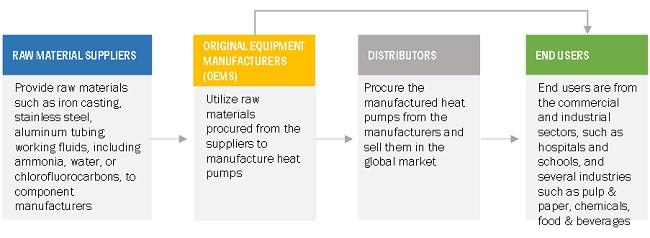The global large-scale natural refrigerant heat pump market is projected to reach USD 9.1 Billion by 2027 from an estimated market size of USD 5.8 Billion in 2022, at a CAGR of 9.4% during the forecast period. Increasing visibility of contribution of heat pump technology in reducing carbon footprint is a driving factor for the market growth. Moreover, growing focus on improving operational efficiency in industrial sector.
Download PDF Brochure @ https://www.marketsandmarkets.com/pdfdownloadNew.asp?id=127999119
A considerable amount of heat is lost to the atmosphere by industrial refrigeration systems, which leads to operational losses and reduction in the overall output efficiency of the plant. Heat pumps can effectively capture this wasted heat and use it to reduce the amount of dependency on fossil fuels which is used for heating applications. The industrial heat pumps are both eco-friendly and cost-efficient, allowing operators to get the most out of their energy resources. Industrial and commercial businesses across the globe are adopting sustainable operations and production techniques. For instance, heat pumps are being used to heat water for processing and equipment sanitation.. Mechanical refrigeration systems are required for processing and cold storage. Electricity is used by these refrigeration systems. The heat received by refrigeration systems is mainly wasted heat and released into the atmosphere. There is significant potential to capture discarded heat and use it to generate hot water, minimizing the usage of fossil fuels. Heat pumps can capture heat that would otherwise be wasted and use it for beneficial heating purposes. This would eventually lead to a rise in the operational efficiency. Heat pumps can now produce high-quality hot water from 140°F (60°C) to 190°F (88°C) due to the recent advancements in industrial screw compressors

Carbon dioxide (R-744) natural refrigerant segment is the fasted growing segment by natural refrigerants in the forecast period from 2022-2027. Companies like Siemens Energy (Germany), Johnson Controls (Ireland), Emerson Electric Co. (US), GEA Group Aktiengesellschaft (Germany), Mitsubishi Electric Corporation (Japan), MAN Energy Solutions SE (Germany), Guangdong PHNIX Eco-energy Solution Ltd. (China) are manufacturing large-scale carbon dioxide (R-744) refrigerant heat pumps for mass production.
Industrial segment is the fastest growing segment by end use segment in the forecast period. European Countries like Japan has made it mandatory for commercial sectors to reduce their carbon footprint either by adopting the renewable and green technologies. Hence, adoption of large-scale natural refrigerant heat pumps in malls, hospitals, office buildings, sports centers can result long term cost savings.
Ask Sample Pages – https://www.marketsandmarkets.com/requestsampleNew.asp?id=127999119
Space heating is one of the most significant sources of energy use around the globe. The complexity of renewing and refurbishing the existing building stock makes it difficult to expand the share of renewable energy in the sector. Particularly when heat pumps are added to the system, district heating is projected to play a vital role in the energy grid and supply. Furthermore, major economies around the globe are adopting strict measures to decarbonize their commercial and industrial activities by impose carbon taxes and reducing the electricity cost. Major player such as Siemens Energy are utilizing large-scale natural refrigerant heat pump for district heating applications.
Related Reports:
Heat Pump Water Heater Market – Global Forecast to 2026


